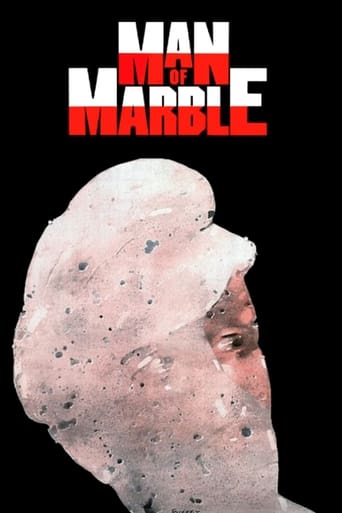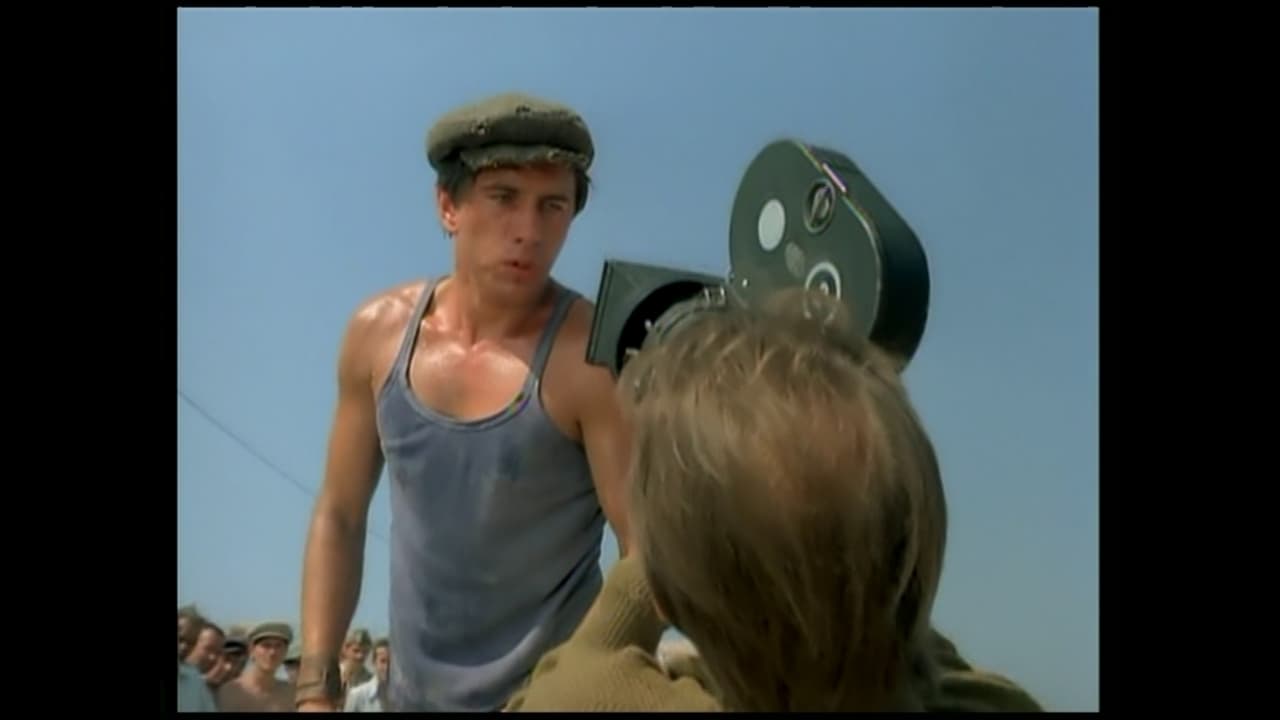Jackson Booth-Millard
I found this Polish film in the book 1001 Movies You Must See Before You Die, alongside its followup Man of Iron which came five years later, and which I almost watched first, this original definitely sounded interesting, from director Andrzej Wajda (Ashes and Diamonds). Basically young filmmaker Agnieszka (Krystyna Janda) is making her diploma film, she decides to focus it on the 1950s, the Stakhanovite movement, and the man who became a symbol of an over-achieving worker, in Nowa Huta, heroic Polish bricklayer Mateusz Birkut (Jerzy Radziwiłowicz). From stock footage, including outtakes and censored footage, in the archives, interviews with some people who knew the propagandist, including his ex-wife, his friends the filmmaker who helped him become a hero to the people, and the marble statue of the man found beneath ground, she chronicles Birkut's life. We see the life of Birkut in flashbacks, including his early beginnings, his fall from grace, and his rise to become a hero during the workers' revolution to the people with his multiple brick laying in building housing, but no-one knows what has happened to him. But Agnieszka's hard-driving style and content for her film are causing concern for the authorities and unnerving her supervisor, they think the student is digging in too deep to recent history, the supervisor kills the project, claiming it is over budget her footage and equipment are confiscated. Agnieszka's father suggests there is a single specific reason the authorities do not want the film to be completed and released, so following her seeing more footage found and the advice, she takes some equipment and goes to find Birkut for herself and ask him questions, even if she is not involved in the making of the film, in the end she does find Birkut's son Maciej Tomczyk (also Radziwilowicz) in the Gdańsk Shipyard, he tells her that his father died years ago. Also starring Tadeusz Lomnicki as Jerzy Burski, Jacek Lomnicki as Young Burski and Michal Tarkowski as Wincenty Witek. I am not sure I know fully why this film was withheld for four years, but it works as both a pseudo-documentary and a thriller of sorts, with a filmmaker going into places she shouldn't go, and seeing the origins of the man she is trying to find out about, I admit there were some slow spots, but all together it is an interesting drama. Very good!
Emil Bakkum
In my recent reviews of the Defa films about the life of Karl Liebknecht I pointed out, that the textbook Bolshevist character is revolutionary and self-sacrificing, willing to exploit itself for the benefit of society. It chanced that I have just seen the Polish film Man of Marble, which elaborates on just this subject. Hence I enjoyed the film, even though the message in the narrative is rather vague. The story plays in the late seventies. The leading thread is a film project, that is meant to finish the studies of Agnieszka, one of the main characters. She decides to make a commentary on the former lead worker Mateusz Birkut, who rose to extreme popularity in the fifties. Then in the aftermath of Stalinism he was discredited and put in prison, apparently simply because he became a bit of a nuisance - like so many others. Agnieszkas project is not welcomed by the authorities, because it reopens old wounds. However, they do provide her with the means to start the project (a camera crew of three people). As the story unfolds, Agnieszka turns out to be a typical news-hawk: intrusive, chasing "great material", without much respect for other peoples feelings. In a chain of interviews the old companions tell about their part in Birkuts career. I don't know if it is intended, but my sympathy went mainly to those characters, people who were less fortunate than Birkut, and nonetheless managed to do something useful with their lives. Birkut starts as a brick layer. He participates in a propaganda project, that aims to boost productivity in building. It uses the division of labor, and the mechanic motion, that in the west is called Taylorism. Birkut is launched as a celebrity, a working class hero, and enjoys all the privileges. Many former colleagues get a dislike for him, since he pushes up their norms. At the same time, the authorities get tired of Birkuts mediation for fellow workers,and try to put him on the sidelines. Birkut ignores the warning signals, and is eventually convicted and imprisoned for four years. In the post-Stalin era he is rehabilitated, but due to his embitterment he remains an outcast. After all these years Agnieszka is unable to track him down, but she finds his son Maciej Tomczyk (Birkut never really married, and later abandoned his girlfriend). Maciej tells that Birkut has passed away. In the sequel Man of Iron we learn that he was actually shot during a workers' upsurge. As said above, the film message is mixed. Birkut is not a man of high morals, but a victim of the system. The increase of labor productivity is a common goal in all economies, no matter what their ideologies may be. In capitalism the driving force is extra pay, or in times of large unemployment the competition between the workers. In the Bolshevist states the workers were supposed to voluntarily exploit themselves. Solshenitsyn once told a story, that just after the revolution the propaganda drove some simple minds to actually work themselves to death. Later productivity was stimulated by giving social rewards for excellent achievements (the famous surpassing of the planned task), in the form of marks of honor (often to a collective or enterprise). Workers ethics in Japan have also been mentally unhealthy. You need trade unions to provide for a counterbalance, and this is in fact the subject of the sequel film Man of Iron. In my opinion the film is not anti-Bolshevist - and it was financed by the state. It just calls for better balances in the social power distribution within the system. Probably there are lots of hidden meanings in the film. For instance, Birkut burns his fingers, after "subversive elements" have heated one of his bricks, which is quite funny. From then on Birkut wears gloves. And a fellow worker of Birkut enters the office of a party bureaucrat and never returns, even though there is no other exit. The legs of Agnieszka move in all directions (you will not see this behavior with for instance Julia Roberts). This category of social films is just my cup of tea, so if you like the type I suggest that you read my other reviews.
potter_flies
'Man of marble' is usually seen as an bold, anti-communist movie which is strikingly accurate at the deep level of practices within communist countries. Indeed, trough a story of a student who tries to make a graduation film Wajda beautifully succeeds in describing at the same time the soft violence of the '70s in Poland and the totally different hardcore 'prison' violence of the Stalinist regime in the 50's. Hence, it is gradually revealed trough the eye of the camera the contrast between the heroic, raw atmosphere of the first communist years and the light perestroika of the present cinematographic time. Nonetheless, there is a common thread throughout the movie as the all-pervading party monopoly deeply affects everybody and no one has the option of an Utopian escape.The no exit strategy is probably for me the main theme of the movie. The rebellious young girl who tries to see beneath the propaganda images is also on psychoanalytical trip to confront her family history.There are two scenes which can more or less summaries the story: in the first one, we can see her right at the beginning in a rough quarrel with her Television supervisor, and we can consequently grasp the theme of the incessant conflict with the authority. However, if on the one level wecan see her rejecting the father figure, on the second level we can witness desire as the film maker is practically possessing the hero statue which she finds in a basement of a museum.Well, basically the catch of the movie is the intertwine of the story with the girl on the way of her desire and the political level which makes this trip also a trip of a historical clearing up. And, in the strange development of we find that the "fake" hero is in fact an authentic one and that we did know the secret of the narrative - the "hero"(the father, the phallus) of the propaganda is the "true" hero, as he had to face real tough moral problems and he lived "the life in truth" . The heroine can develop at last real emotional attachment with the paternal image and she eventually can end her trip by accepting an ally and a friend in the final scene.
Oblomov_81
Wajda's MAN OF MARBLE is one of the most compelling attacks on government corruption that I have ever seen. It is a "Citizen Kane"-styled story of a female film student who tries to trace the history of Birkut, a long-forgotten "hero" of the Polish Communist government.She begins by viewing propaganda film that praises Birkut as a devout worker who slaves away at brick-laying for the officials. He has the appearance of a vigilant, Hercules-like strongman who breezes through the labor without breaking a sweat. Then she goes to interview the director, who was hired by the government. He tells her about the reality of making the film, such as how Birkut was given extra food and water (unlike the other bricklayers). Wajda uses these two conflicting scenes to deconstruct the false imagery that propaganda gives its viewers. He shows us how officials manipulate such situations to their own political good.The student goes on to interview other subjects who describe the brutal reality of Birkut's off-camera existence. In one devastating scene, she meets his wife, who breaks down and tries to avoid being interviewed. As the truth becomes clearer and clearer, the government begins to intercede in the production of the student's film.Wajda was a film-maker who was not afraid to criticize the harsh Polish government that eventually was defeated by individuals such as Lech Walesa. MAN OF MARBLE is a testament to those who had to live through the oppression of Communism, and also to those who are still living under its iron fist.


 AD
AD




